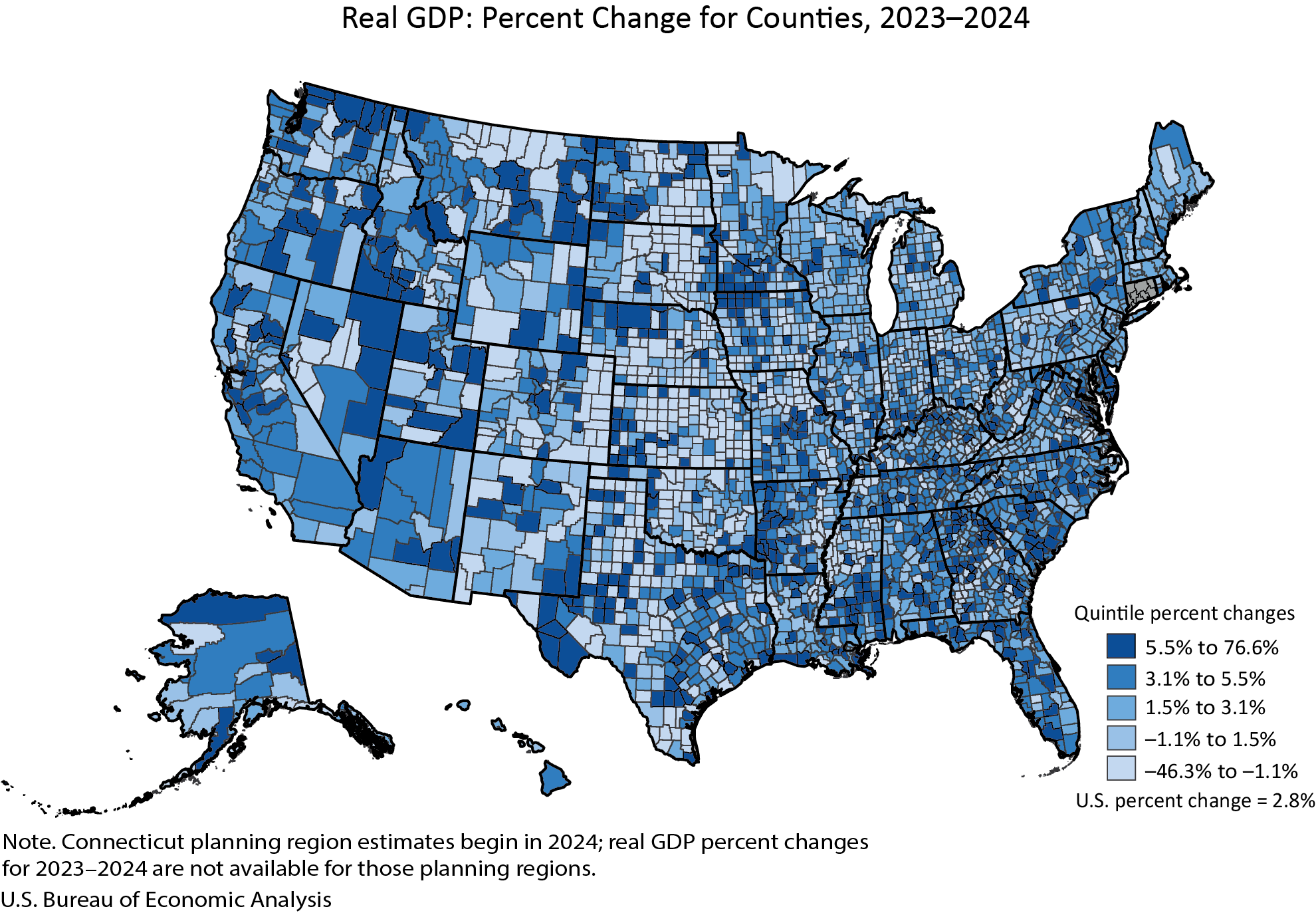Bureau of Economic Analysis
Gross Domestic Product by County and Personal Income by County, 2024
Real gross domestic product (GDP) increased in 2,273 counties, decreased in 809 counties, and was unchanged in 24 counties in 2024. County-level changes ranged from a 76.6 percent increase in Carter County, MT, to a 46.3 percent decline in Baca County, CO.
Personal income, in current dollars, increased in 2,768 counties, decreased in 331, and was unchanged in 7 counties in 2024. County-level changes ranged from a 22.6 percent increase in Harding County, SD, to a 23.3 percent decline in Issaquena County, MS.
Principal Federal Economic Indicators
Noteworthy
The Latest
Producto interior bruto para Puerto Rico, 2021
El producto interior bruto real (PIB) para Puerto Rico creció 4.0 por ciento en 2021, luego de decrecer 6.2 por ciento en 2020. El crecimiento en el PIB real en 2021 reflejó principalmente un crecimiento en los gastos de consumo personal. La inversión bruta en capital fijo también creció. Estos crecimientos se contrarrestaron parcialmente con los decrecimientos en las exportaciones, en la inversión privada en inventarios y en el gasto de…
Gross Domestic Product for Puerto Rico, 2021
Real gross domestic product (GDP) for Puerto Rico increased 4.0 percent in 2021 after decreasing 6.2 percent in 2020. The increase in real GDP in 2021 primarily reflected an increase in personal consumption expenditures. Private fixed investment also increased. These increases were partly offset by decreases in exports, private inventory investment, and government spending. Imports, which is a subtraction item in the calculation of GDP,…
Personal Income and Outlays, June 2023
Personal income increased $69.5 billion (0.3 percent at a monthly rate) in June. Disposable personal income (DPI)—personal income less personal current taxes— increased $67.5 billion (0.3 percent). Personal outlays—the sum of personal consumption expenditures, personal interest payments, and personal current transfer payments—increased $109.4 billion (0.6 percent) and consumer spending increased $100.4 billion (0.5 percent). Personal saving…
Personal Income and Outlays, June 2023
Personal income increased $69.5 billion (0.3 percent at a monthly rate) in June. Disposable personal income (DPI)—personal income less personal current taxes— increased $67.5 billion (0.3 percent). Personal outlays—the sum of personal consumption expenditures, personal interest payments, and personal current transfer payments—increased $109.4 billion (0.6 percent) and consumer spending increased $100.4 billion (0.5 percent). Personal saving was…
Gross Domestic Product, Second Quarter 2023 (Advance)
Real gross domestic product (GDP) increased at an annual rate of 2.4 percent in the second quarter of 2023, according to the "advance" estimate. In the first quarter, real GDP increased 2.0 percent. The increase in the second quarter primarily reflected increases in consumer spending and business investment that were partly offset by a decrease in exports. Imports, which are a subtraction in the calculation of GDP, decreased.
Gross Domestic Product, Second Quarter 2023 (Advance Estimate)
Real gross domestic product (GDP) increased at an annual rate of 2.4 percent in the second quarter of 2023, according to the "advance" estimate. In the first quarter, real GDP increased 2.0 percent. The increase in the second quarter primarily reflected increases in consumer spending and business investment that were partly offset by a decrease in exports. Imports, which are a subtraction in the calculation of GDP, decreased.
Direct Investment by Country and Industry, 2022
The U.S. direct investment abroad position, or cumulative level of investment, increased $212.2 billion to $6.58 trillion at the end of 2022 from $6.37 trillion at the end of 2021, according to statistics released today by the U.S. Bureau of Economic Analysis. The increase reflected a $172.8 billion increase in the position in Europe, primarily in the Netherlands and the United Kingdom. By industry, manufacturing affiliates had the largest…
Direct Investment by Country and Industry, 2022
The U.S. direct investment abroad position, or cumulative level of investment, increased $212.2 billion to $6.58 trillion at the end of 2022 from $6.37 trillion at the end of 2021, according to statistics released today by the U.S. Bureau of Economic Analysis. The increase reflected a $172.8 billion increase in the position in Europe, primarily in the Netherlands and the United Kingdom. By industry, manufacturing affiliates had the largest…
New Foreign Direct Investment in the United States, 2022
Expenditures by foreign direct investors to acquire, establish, or expand U.S. businesses totaled $177.5 billion in 2022, down $185.1 billion from $362.6 billion in 2021.
New Foreign Direct Investment in the United States, 2022
Expenditures by foreign direct investors to acquire, establish, or expand U.S. businesses totaled $177.5 billion in 2022, down $185.1 billion from $362.6 billion in 2021.




